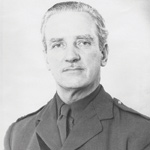|
Major Fred Adams
Late Scots Guards
|
 Fred Adams was born in Ayrshire on the 28th November 1919. After leaving school he took up an apprenticeship in a horticultural nursery which kindled his life-long love of gardening. Later on he had the opportunity to be a trainee game keeper on the Johnny Walker (Whisky) family estates in Ayr but, after savouring the culture, he decided to look for something better. Fred Adams was born in Ayrshire on the 28th November 1919. After leaving school he took up an apprenticeship in a horticultural nursery which kindled his life-long love of gardening. Later on he had the opportunity to be a trainee game keeper on the Johnny Walker (Whisky) family estates in Ayr but, after savouring the culture, he decided to look for something better.
He enlisted in the Scots Guards on the 8th February 1940. One of his earliest memories was during The Blitz when he was on fire watch on the top of The White Tower at the Tower of London. He could see the German planes as they flew up the Thames dropping their bombs. Later in the war he was posted to Italy to join the 1st Battalion. He recalled the weather was awful and the terrain mountainous; every time a position was captured the Brigade Commander would arrive full of congratulations and point to the furthest ridge as the next objective and, of course, people got hurt which they didn’t tell you about in training. He finished the war at Trieste confronting Tito’s troops on the Italian/Yugoslav border.
In 1948 during the Malayan Emergency, Fred served with the 2nd Battalion as a Company Quartermaster Sergeant. He was subsequently promoted to Company Sergeant Major and posted to RMA Sandhurst. Here he was to make a lifelong friendship with his Senior Under Officer David Hodge who went on to be a Colonel in the Royal Artillery.
In 1956, Fred was appointed Regimental Sergeant Major of Aberdeen University Officer Training Corps and two years later moved to take over as Regimental Sergeant Major of the 2nd Battalion - an appointment he held for six years serving at Tidworth, Wellington Barracks and Kenya.
Whilst at Wellington Barracks he was the subject of ill informed criticism when the MP for Stoke-on-Trent watching a Guard Mounting complained of the ‘big fat Regimental Sergeant Major with a big out of date moustache’. Fred was subsequently defended by the then War Minister, Mr Profumo, in the House of Commons. It turned out that the MP had actually seen Pipe Major Bob Crabbe who became the iconic face on Scottish Shortbread Tins!
On commissioning, he was Transport Officer of both Battalions and later Technical Quartermaster of the 2nd Battalion. Finally he was appointed Housing Commandant at Pirbright, a post he was to hold for 14 years both as a serving and retired Officer. On his retirement as Housing Commandant in 1984, a lunch was held in his honour in the 1st Battalion Officer’s Mess. It was subsequently described as one of the largest gathering of Household Division Quartermasters ever witnessed.
In 2009, Lord Vestey hosted a lunch to honour Fred’s 90th birthday at the Goring Hotel. Fred had served with Lord Vestey’s father in Left Flank of the 1st Battalion in Italy in 1944.
Fred was a wonderfully balanced, civilised person, seemingly always calm and measured in his reactions and invariably right. He was fun, humorous and loyal to the ‘nth degree. He never raised his voice or used rough language. He had a natural air of authority about him that only a very few are blessed with.
There were three great passions in his life - his family, his regiment and his garden. He married Hilda in 1950 and to whom he was utterly devoted. Their daughter Gilda was born in 1952 and of whom they were both immensely proud. After Gilda’s marriage to John, three grandchildren were born, Rachel, Giles and Louise.
Fred and Hilda loved to holiday on the Amalfi coast at Rimini. They supported every Regimental occasion over many years. Gilda described her parents as like sticks of Blackpool Rock with Scots Guards written through them both. When Hilda died unexpectedly in 1997 it was a loss that Fred was never to fully recover from. He was, however, wonderfully supported by his daughter and her family. They were both totally overwhelmed by the enormous loving support offered to them by The Regiment, both past and present. Gilda visited her father every day for the next 17 years - a love that Fred cherished.
Fred died shortly after his 95th birthday. Gilda and the family have been very touched by all the wonderful letters they have following his death. He was a strong, loving, witty and remarkable man. When asked if there was anything he would have changed in his life he replied:
‘Not a single thing! The decision to join the Scots Guards opened up so many experiences over and above my expectations back in 1940. No matter what one’s background, The Regiment offered the opportunity if you applied yourself, to progress your career. Moreover the many deep and lasting friendships and acquaintances across the Forces, such great characters, contributed to a very happy, fulfilled life. I couldn’t have asked for more’.
|
|